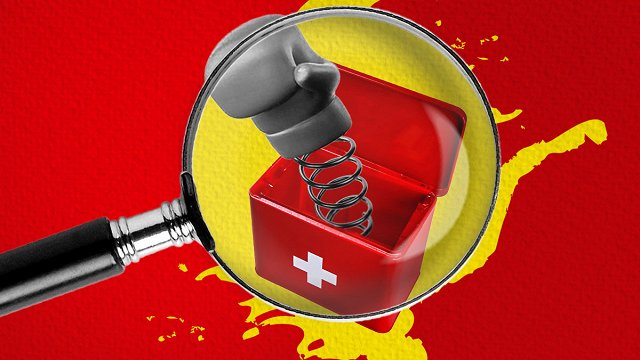The NATO commander assured viewers that "we already have a powerful response force" that ensures "nobody can be left in any doubt whatsoever that NATO is rock solid behind the principle of collective defense."
General Bradshaw characterized the Very High Readiness Joint Task Force emergent from the post-Wales Summit as having "substantial operational capabilities which are very well matched against the sort of forces that we see poised along the border of eastern Ukraine."
However, he emphasized that "this force is entirely defensive in nature, our responses right from the beginning of this crisis have been defensive, proportionate and will continue to be so."
The Deputy Supreme Commander also pointed out that strategic deterrence must be multi-faceted and never become a singularly military imperative. Rather, he recalled, "we work in NATO to the principle of political control of military capability. That’s an important underpinning principle of our democratic way of life. The military forces exist to sustain that system," he explained.
"The most efficient strategic response is always a response which takes into account not only military imperatives but also political, diplomatic, economic, social imperatives. That is the nature of strategy.
To go down a path which has decisions which are made entirely in the miltary domain is not a strategic approach to solving our problems.
Actually the very best and most effective systems that I’ve seen are ones where there is complete integration between military and policy staffs.
It's the safest and most effective way of doing business.
Quite clearly, since the intent is to have it on the ground in a very short space of time it goes without saying that the decision-making process needs to support that timing of deployment and we will put the necessary pieces in place to make that so," he said.
As for how some of these multi-faceted approaches might play out in the Baltic states, the NATO general pointed out that only local people know the situation best and that they and their elected governments should best know how to respond to attempts to destabilize society.
"I think it is necessary to counter the poisonous blatant propaganda that is pumped out over Russian TV stations. This is an area of engagement which is a very necessary part of a defensive strategy against such a threat but absolutely manifestly does not sit in the military domain. Indeed if the military got involved in this , we would be vulnerable to accusations of counter-propaganda, when in fact what we want is for people to be aware of the truth...This just cannot be sub-contracted to the military alone," he said.
He also pointed to the "very strong consensus" of NATO members in signaling "profound recognition of a new security paradigm in Europe."
As for the willingness to protect even one of its smallest members, General Bradshaw echoed US President Obama's Tallinn speech: "We are rock solid behind Article 5, nobody is in any doubt that is our raison d'etre. There is no question, we've already signed up to it."
He continued "if we put deterrence in place properly, we need never have this fight. That’s the whole point of building thoroughly effective deterrence. That nobody makes the awful mistake of believing they can take on any nation within NATO and not be involved in a decisive strategic conflict with the whole of NATO.
And no nation on Earth would wish that."
At the close of the interview the general recalled his taking part in the opening of the Lielvārde airfield Thursday, calling it an "excellent" facility that shows Latvia to be "playing an extremely important part, like every nation along the eastern side of the alliance." He said the new infrastructure and facilitation sites that NATO was building up to deter Russia's willingness to use military power as a means of international relations "does not cut across" and should be possible to maintain "within the spirit of the NATO-Russia Founding Act."
























